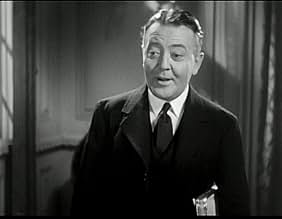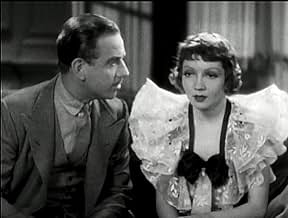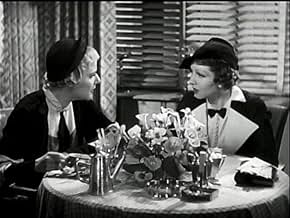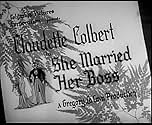NOTE IMDb
6,5/10
775
MA NOTE
Ajouter une intrigue dans votre langueAn efficient secretary at a department store marries her boss, but discovers that taking care of him at home is a lot different to taking care of him at work.An efficient secretary at a department store marries her boss, but discovers that taking care of him at home is a lot different to taking care of him at work.An efficient secretary at a department store marries her boss, but discovers that taking care of him at home is a lot different to taking care of him at work.
- Réalisation
- Scénario
- Casting principal
- Récompenses
- 1 victoire au total
Grace Hayle
- Agnes Mayo
- (as Grace Hale)
Ernie Adams
- Passerby
- (non crédité)
William Arnold
- Department Head
- (non crédité)
Lynton Brent
- Assistant Window Dresser
- (non crédité)
Edmund Burns
- Newspaper Photographer
- (non crédité)
A.S. 'Pop' Byron
- Store Watchman
- (non crédité)
Avis à la une
She Married Her Boss is one of those films where the title says it all, no need for any elaboration. Of course the bride is Claudette Colbert who's been crushing out on boss Melvyn Douglas for years.
But before she's a bride Claudette is a secretary and a most efficient one at that. She's got the business well organized, but Douglas's home is something of a shambles with spoiled brat of a daughter Edith Fellows ruling the roost and some crooked household help ripping him off.
So it's a business arrangement that Douglas has in mind when he marries Colbert. But he's slow on the uptake to realize that Colbert has romance in mind. Playboy Michael Bartlett is not slow however and he's got a nice singing voice to go with some oily charm.
Colbert and Douglas get some nice support from folks like Raymond Walburn as the new butler who gets tanked with Douglas, Katharine Alexander as Douglas's snooty sister and Jean Dixon doing the Eve Arden part before Eve Arden was around.
Gregory LaCava directed She Married Her Boss and we're certainly not seeing a director's cut. Harry Cohn's editors at Columbia Pictures butchered this one, the film ends rather abruptly though in truth you know where it all is going. And people who've had loved ones killed by drunk drivers won't find Raymond Walburn careening drunkenly through the streets behind the wheel all that funny.
Still the stars and the planets do shine in She Married Her Boss.
But before she's a bride Claudette is a secretary and a most efficient one at that. She's got the business well organized, but Douglas's home is something of a shambles with spoiled brat of a daughter Edith Fellows ruling the roost and some crooked household help ripping him off.
So it's a business arrangement that Douglas has in mind when he marries Colbert. But he's slow on the uptake to realize that Colbert has romance in mind. Playboy Michael Bartlett is not slow however and he's got a nice singing voice to go with some oily charm.
Colbert and Douglas get some nice support from folks like Raymond Walburn as the new butler who gets tanked with Douglas, Katharine Alexander as Douglas's snooty sister and Jean Dixon doing the Eve Arden part before Eve Arden was around.
Gregory LaCava directed She Married Her Boss and we're certainly not seeing a director's cut. Harry Cohn's editors at Columbia Pictures butchered this one, the film ends rather abruptly though in truth you know where it all is going. And people who've had loved ones killed by drunk drivers won't find Raymond Walburn careening drunkenly through the streets behind the wheel all that funny.
Still the stars and the planets do shine in She Married Her Boss.
"She Married Her Boss" is a forgotten but alluring Columbia classic, directed by Gregory La Cava, a modest auteur with a flair for upbeat improvisation and delicate touch. La Cava's unassuming touch is less fully evident in this small heartwarming romantic comedy than the director's superior pictures like "Stage Door", "My Man Godfrey", and "Primrose Path".
But "She Married Her Boss" features highly resourceful Claudette Colbert as the competent department store secretary Julia that falls for her boss Richard Barclay (Melvyn Douglas); it also has an unintentionally funny, almost surreal moment involving a department store window and mannequins. As it turns out the film is all Colbert's -- and another reminder what a lovely, divine comedienne Ms. Colbert was. The supporting cast, all wonderful, includes
"She Married Her Boss" is the sort of cuddly classic that works best if you watch it with someone you love or care about.
But "She Married Her Boss" features highly resourceful Claudette Colbert as the competent department store secretary Julia that falls for her boss Richard Barclay (Melvyn Douglas); it also has an unintentionally funny, almost surreal moment involving a department store window and mannequins. As it turns out the film is all Colbert's -- and another reminder what a lovely, divine comedienne Ms. Colbert was. The supporting cast, all wonderful, includes
"She Married Her Boss" is the sort of cuddly classic that works best if you watch it with someone you love or care about.
Terribly uneven mix of comedy and romantic drama, the script of SHE MARRIED HER BOSS is unworthy of the talents assembled to interpret it. The always reliable Claudette Colbert has to contend with lines like: "Marriage is a woman's real career," as a woman secretly in love with her boss for six years. MELVYN DOUGLAS is the boss, but his part his so poorly written that you have to wonder what Colbert ever sees in him. Nevertheless, he plays it with a flair for this sort of inane comedy.
JEAN DIXON as Colbert's friend and KATHERINE Alexander as Douglas' snooty sister are just cardboard cutouts. And poor EDITH FELLOWS has to play the most insufferable brat since Bonita Granville's turn in THE CHILDREN'S HOUR.
There are various lapses of taste throughout (from today's viewpoint), and the costumes are really the most unflattering female designs ever worn by Colbert in any of her early films. You have to yearn for the Colbert of the '40s (so smartly sophisticated) because she looks downright dowdy in most of her odd wardrobe choices. As I say above, dated in more ways than one.
Not recommended.
JEAN DIXON as Colbert's friend and KATHERINE Alexander as Douglas' snooty sister are just cardboard cutouts. And poor EDITH FELLOWS has to play the most insufferable brat since Bonita Granville's turn in THE CHILDREN'S HOUR.
There are various lapses of taste throughout (from today's viewpoint), and the costumes are really the most unflattering female designs ever worn by Colbert in any of her early films. You have to yearn for the Colbert of the '40s (so smartly sophisticated) because she looks downright dowdy in most of her odd wardrobe choices. As I say above, dated in more ways than one.
Not recommended.
Most modern viewers of 1930's comedies will be accustomed to the necessity of suspending disbelief and modern sensibilities to entirely enjoy these films. However, She Married Her Boss contains one or two scenes which make this a difficult task. The main problematic scene is the drunk driving scene which is sufficiently reckless as to be just plain alarming to modern audiences but fortunately occurs at the end of the movie so as not to be troubling throughout. The second such scene however is the (aural) scene of Julia (Claudette Colbert) spanking Anabelle several times with a hairbrush. In modern times, with the idea of physically punishing children being so controversial, this scene refuses to simply fade into the background of the film and become simply a comedic scene and lingers in a slight feeling of unease in watching the remainder of the film despite Annabelle's growing affection for Julia. Simliarly Julia's friends taunts of Annabelle appear somewhat cruel; being adults ganging up on an unhappy child, no matter how obnoxious her behaviour.
Although some of the comedic aspects of the film may not translate to a modern audience, the film nevertheless contains some gems of serious scenes - Claudette Colbert's reaction to her husband mocking her for behaving like a woman and his criticism that she is making their marriage "just like any other marriage". Similarly the shop dummy scene can be enjoyed on a number of levels, the drunken comedy is delightful but also wonderful is Colbert's pained expression and declaration that "Julia doesn't live here anymore". Finally my favourite scene of the film, when Melvyn Douglass confronts Colbert after her antics in the shop window appear in the press, effectively calling her "second hand goods". Colberts reactions from resignation, to pride to hurt to confrontation are a pure acting lesson.
While some of the comedy may struggle to appeal to modern audiences, the scene of the new bride (Colbert) being carried over the thresh-hold by her new husband's butler remains one of the funniest moments in 1930's comedy and Julia's kicking of the child shop dummy (surely a reaction to her troubled step-daughter) remains a guilty pleasure so that despite some reservations the film continues to work on both the dramatic and comedic levels despite some need to be prepared more than usual to put modern considerations aside to entirely enjoy this.
Although some of the comedic aspects of the film may not translate to a modern audience, the film nevertheless contains some gems of serious scenes - Claudette Colbert's reaction to her husband mocking her for behaving like a woman and his criticism that she is making their marriage "just like any other marriage". Similarly the shop dummy scene can be enjoyed on a number of levels, the drunken comedy is delightful but also wonderful is Colbert's pained expression and declaration that "Julia doesn't live here anymore". Finally my favourite scene of the film, when Melvyn Douglass confronts Colbert after her antics in the shop window appear in the press, effectively calling her "second hand goods". Colberts reactions from resignation, to pride to hurt to confrontation are a pure acting lesson.
While some of the comedy may struggle to appeal to modern audiences, the scene of the new bride (Colbert) being carried over the thresh-hold by her new husband's butler remains one of the funniest moments in 1930's comedy and Julia's kicking of the child shop dummy (surely a reaction to her troubled step-daughter) remains a guilty pleasure so that despite some reservations the film continues to work on both the dramatic and comedic levels despite some need to be prepared more than usual to put modern considerations aside to entirely enjoy this.
Executive secretary marries her (presumably divorced) boss, a department store magnate, and tries making a home for them both and his bratty nine-year-old daughter; the trouble is, he thought he married a savvy, sharp businesswoman, not a "flouncy, coy" housewife. Interesting depiction of a woman's role in the workplace--circa 1935--vis-à-vis her role as a wife and stepmother. Some of the high society patter is fast and fresh, but when the moviemakers get maudlin, the picture goes down the drain. Claudette Colbert gives a good performance, though Melvyn Douglas gets stuck with the worst of it (walking in on family frivolity with a scowl, misunderstanding a compromising photo of his wife in the newspaper, getting drunk along with the butler, etc.). Sassy Edith Fellows gives it a goose until she, too, is reduced to hysterics. ** from ****
Le saviez-vous
- AnecdotesThe beginning theme music is the same as the 1934 movie It Happened One Night.
- Citations
Julia Scott: This is Grandma Scott. She knitted the Dred Scott decision on a piece of old burlap.
Meilleurs choix
Connectez-vous pour évaluer et suivre la liste de favoris afin de recevoir des recommandations personnalisées
Détails
- Durée1 heure 25 minutes
- Couleur
- Rapport de forme
- 1.37 : 1
Contribuer à cette page
Suggérer une modification ou ajouter du contenu manquant

Lacune principale
By what name was Mon mari le patron (1935) officially released in India in English?
Répondre


































